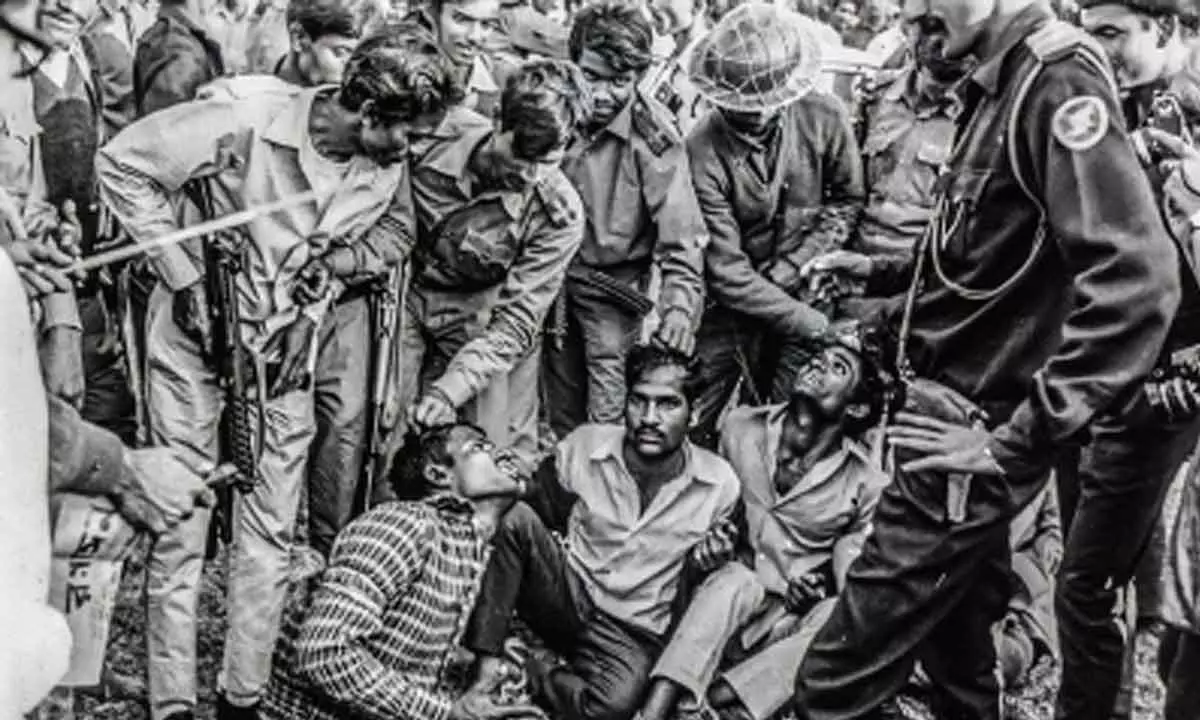Live
- TTD unveils vision for Global Outreach
- Women should not be confined to homes: CM Naidu
- Xmas bells toll in churches as city glows with festive joy
- Governor, CM extend Christmas greetings
- Beacons of hope and love born on December 25
- Vajpayee’s legacy lives on as country marks his birth centenary
- Rythu Bharosa to pick best from PM -KISAN scheme
- Medak wears season’s festive look
- TG sets record in fine rice purchase
- Maintaining India’s growth momentum
Just In
1971: Pak mum on apology to Bangla


What perplexes one is that though the Taliban describe most of these decisions as Islamic, in fact they are completely unIslamic. Islam gives equal rights to men and women in all spheres of life, including, education, inheritance, right to work, say in marriage. Yet, in action Taliban goes completely against the spirit and teachings of Islam
Predictably, the Pakistani Minister of State was unable to offer any reassurance to Momen that Islamabad was ready to come forth with an apology to Bangladesh. Indeed, this continued failure on the part of successive governments in Pakistan has stood in the way of an improvement in bilateral relations between Bangladesh and Pakistan. Given the circumstances which have defined ties between the two countries since the surrender of the Pakistan occupation army to a joint India-Bangladesh military command in December 1971, it is unlikely that any doors will be opened to better diplomatic relations between Dhaka and Islamabad.
Pakistan's rulers, beginning with Zulfikar Ali Bhutto, have over the decades expressed their regrets over the tragedy committed in 1971. But none of them have ever ventured the thought that Pakistan is ready to express contrition for the atrocities committed by its soldiers in the course of Bangladesh's war of liberation. Prime Minister Bhutto, on a visit to Dhaka in June 1974, was rather unwilling to visit the National Martyrs Memorial outside Dhaka. But when diplomatic norms compelled him to visit the memorial, he displayed a high degree of rudeness when he refused to doff his cap or to sign the visitors' book.
Pakistani attitudes to the acts of Islamabad's soldiers in Bangladesh have been an amalgam of the curious and the bizarre. General Ziaul Haq, who laid a wreath at the memorial in 1985, was asked by Bangladeshi journalists about his response to the repression exercised by his country's army in 1971. His reply was as unclear as it was vague. 'Your heroes are our heroes,' he averred. And that was that. In subsequent years, Nawaz Sharif and Benazir Bhutto were clearly reluctant to be drawn into the apology debate. It may be recalled that Benazir Bhutto, a student at Harvard during the Bangladesh crisis, chose to take her father's word for what was happening in Pakistan's rebellious province rather than analyse conditions through reading western newspapers.
As for Nawaz Sharif, his government was thoroughly riled by the trials of Pakistan's Bengali collaborators, many of whom had been rehabilitated by the regimes of General Ziaur Rahman and General Hussein Muhammad and by the civilian government of Khaleda Zia in the dark era covering 1975-1996 and 2001-2006, by the government of Prime Minister Sheikh Hasina. The Pakistan national assembly adopted a resolution condemning the trials of what it considered loyal Pakistanis in Bangladesh.
That the state of Pakistan remains uncomfortable over the apology issue is nowhere more pronounced than a display of posters relating to the 1971 war in the museum of the Pakistan army in Lahore. The posters are a powerful hint of how Pakistan remains unable or unwilling to own up to the murder and rape of Bengalis committed by its soldiers in the nine months of the war in Bangladesh between March and December 1971.
One of the posters at the army museum would have one know that in 1971 it was not the Pakistan army but Bangladesh's Mukti Bahini which 'committed genocide' in Bangladesh. A second poster, referring to Delhi's involvement in the conflict, notes that it was the Indian government which presided over the formation of South Asia's first 'terrorist' outfit. The outfit, in the eyes of the Pakistan army, was the Mukti Bahini.
Given such knowledge, what forgiveness for Pakistan's civil-military establishment on the tragedy of 1971? Foreign Minister Momen has spoken on behalf of Bangladesh to Hina Rabbani Khar. The likelihood is that the conversation did not register with the Pakistani Minister of State for Foreign Affairs.The loss is Pakistan's.
(Writer is a journalist, author and commentator on South Asian and American politics based in Dhaka and London)

© 2024 Hyderabad Media House Limited/The Hans India. All rights reserved. Powered by hocalwire.com






